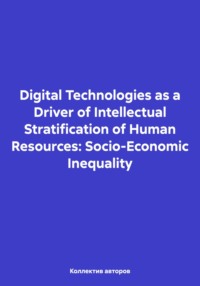Read the book: «Digital Technologies as a Driver of Intellectual Stratification of Human Resources: Socio-Economic Inequality»
International Journal of Recent Technology and Engineering (IJRTE)
ISSN: 2277–3878 (Online), Volume-8 Issue-2, July 2019
Mihail Nikolaevich Dudin, Oleg Fedorovich Shakhov, Margarita Sergeevna Shakhova, Ekaterina Petrovna Rusakova, Yulia Sergeevna Sizova
Revised Manuscript Received on 30 July 2019.
* Correspondence Author
Mihail Nikolaevich Dudin*, Market Economy Institute of RAS (MEI RAS), Moscow, Russia; Russian Presidential Academy of National Economy and Public Administration (RANEPA), Moscow, Russia.
Oleg Fedorovich Shakhov, Russian Presidential Academy of National Economy and Public Administration (RANEPA), Moscow, Russia.
Margarita Sergeevna Shakhova, Lomonosov Moscow State University (MSU), Moscow, Russia.
Ekaterina Petrovna Rusakova, Peoples' Friendship University of Russia (RUDN University), Moscow, Russia.
Yulia Sergeevna Sizova, Plekhanov Russian University of Economics, Moscow, Russia.
© The Authors. Published by Blue Eyes Intelligence Engineering and Sciences Publication (BEIESP). This is an open access article under the CC-BY-NC-ND license http://creativecommons.org/licenses/by-nc-nd/4.0/
Abstract: The goal of the research is to cover the problem of digital inequality considering its negative consequences for society, to conduct a geospatial analysis of the distribution of informational resources among the countries around the world and to determine the main trends of their technological development. Methods. This article uses the following methods: empirical, systematic, analytical, economic and other methods for the research of digital technologies as a driver of intellectual stratification of human resources. Results. The author has studied digital technologies as a driver of intellectual stratification of human resources. The article analyzes the phenomenon of digital inequality as one of the key problems of microsystem development, as well as the geospatial characteristics of this problem.
Index Terms: digital inequality, digital technologies, geospatial features, intellectual stratification, microsystem.
I. INTRODUCTION
In the modern era of the emergence of information society and globalization, there is an urgent need to access information resources both at the national and international levels. The features of modern times include the important role of information and information technology (IT) in the socio-economic relations of humanity, the growing share of information products and services in GDP of the world’s economies and an increase in the number of people employed in the sphere of information and communications technology (ICT). This explains the relevance of the search for ways to eliminate digital inequality as a phenomenon that poses a challenge for society at this stage of its development.
In view of the above, the goal of the research is to cover the problem of digital inequality considering its negative consequences for society, to conduct a geospatial analysis of the distribution of information resources among countries and to determine the main trends of their technological development.

